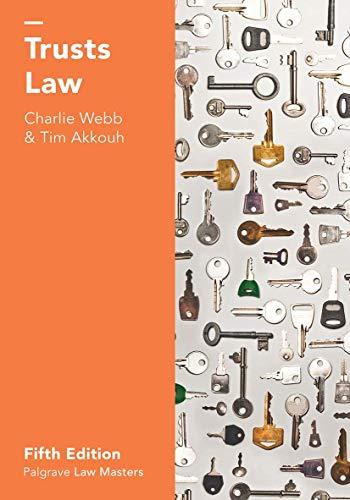Question
Please respond to the following professor's discussion no more than 200 words, and ask 2 Questions and provide references (CITATION) The Supreme Court explains its
Please respond to the following professor's discussion no more than 200 words, and ask 2 Questions and provide references (CITATION)
The Supreme Court explains its decisions in terms of law and precedent. Stare decisis is the very basis of what makes the Supreme Court strong. Like other institutions of government, justices are influenced by institutional concerns, prior experience, and personal philosophy. But it is the Supreme Court itself that decides what the laws actually mean and what importance the precedent will actually have. Throughout its history, the Court has shaped and reshaped law.
In the late nineteenth and early twentieth centuries, the Supreme Court held that the Constitution, law, and precedent permitted racial segregation in the United States. Beginning in the 1950s, the Court found that the Constitution prohibited segregation and that the use of racial categories in legislation was always suspect. By the 1970s and 80s, the Court once again held that the Constitution permitted the use of racial categories - when they were needed to help members of minority groups (affirmative action). Since the 1990s the Court has retreated from this position as well, indicating that governmental efforts to provide extra help to racial minorities could represent an unconstitutional infringement on the rights of the majority.
How do you feel about the Supreme Court "changing their mind"? After all, they are the Supreme law of the land. Quite recently, the Supreme Court has taken up two cases challenging affirmative action for college admissions. Against the University of North Carolina and Harvard University. Please read the article Supreme Court Seems Ready to Throw Out Race-Based College Admissions. What are your thoughts on the Supreme Court, once again, reversing its stance on affirmative action? This is not meant to be a debate on whether or not affirmative action should be legal. The conversation should be on whether the Supreme Court is right in constantly changing its stance. What reasons does the Supreme Court have for changing its stance? Is it right, or wrong?
Step by Step Solution
There are 3 Steps involved in it
Step: 1

Get Instant Access to Expert-Tailored Solutions
See step-by-step solutions with expert insights and AI powered tools for academic success
Step: 2

Step: 3

Ace Your Homework with AI
Get the answers you need in no time with our AI-driven, step-by-step assistance
Get Started


